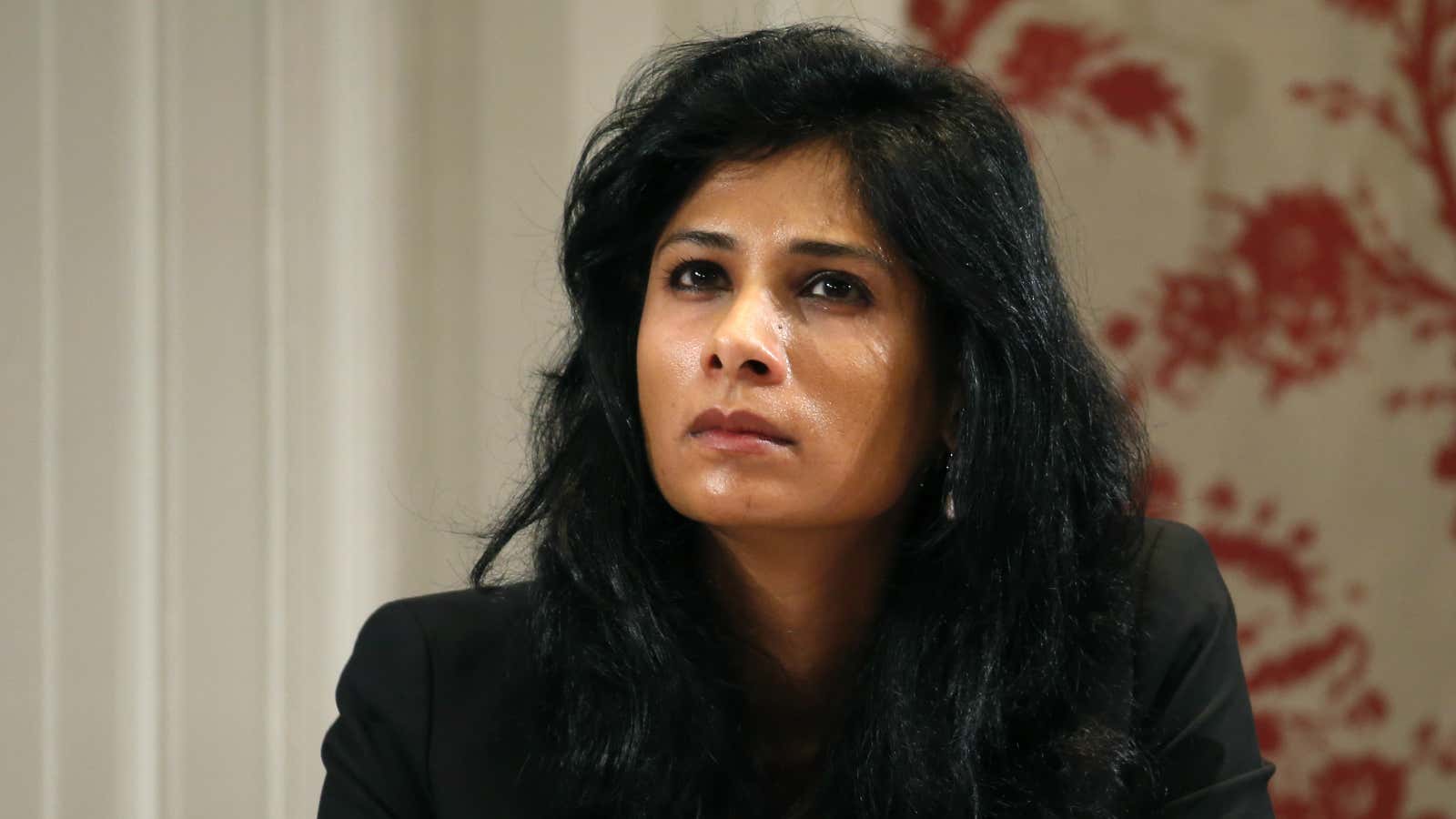India-born Gita Gopinath has been appointed chief economist of the International Monetary Fund (IMF), becoming the first woman to hold the position.
“Gita is one of the world’s outstanding economists, with impeccable academic credentials, a proven track record of intellectual leadership, and extensive international experience,” Christine Lagarde, the IMF’s managing director said in an Oct. 01 release announcing the appointment. “All this makes her exceptionally well-placed to lead our research department at this important juncture.”
The John Zwaanstra professor of International Studies and Economics at Harvard University since 2015, Gopinath will take over from Maurice Obstfeld, who retires in December.
The 46-year-old will be the second Indian to take up the position at the Washington DC-based IMF, after Raghuram Rajan (2003-06), the former Reserve Bank of India governor.
Through her work as an academic—her specialisations are macroeconomics and trade—and an economic advisor to large financial institutions and governments, Gopinath has built a credible name for herself over the years.
Her profile on the Harvard university’s website lists her work as:
…co-director of the International Finance and Macroeconomics program at the National Bureau of Economic Research, a visiting scholar at the Federal Reserve Bank of Boston, member of the economic advisory panel of the Federal Reserve Bank of New York, economic adviser to the chief minister of Kerala state (India), co-editor of the American Economic Review, co-editor of the current Handbook of International Economics and was managing editor of the Review of Economic Studies. She also served as a member of the Eminent Persons Advisory Group on G-20 Matters for India’s ministry of finance. In 2018 she was elected a fellow of the American Academy of Arts and Sciences.
In 2014, Gopinath was named one of the top 25 economists under 45 by the IMF.
Growing up
Gopinath grew up in the Indian city of Mysore (now Mysuru). Her family hails from Kerala’s Kannur district. Her father, TV Gopinath, is a farmer and entrepreneur, her mother a homemaker.
An economics graduate (pdf), Gopinath spent her early years studying at the Delhi School of Economics and New Delhi’s Lady Sriram College before moving overseas. “When I was doing my bachelors from Delhi University, India experienced its first major external financing and currency crisis in 1990-91. This inspired me to pursue graduate work in economics and was the foundation for my interest in international finance,” Gopinath once said about her desire to specialise in the field of economics.
She completed her PhD in economics in 2001 from Princeton University, studying under prominent economists Kenneth Rogoff and Ben Bernanke, former chair of the US Federal Reserve.
Gopinath then established her academic career over the next nearly two decades.
In 2001 she was appointed assistant professor of economics at the University of Chicago’s Graduate School of Business. In 2005, she moved to Harvard.
She has advised large financial institutes and state governments and also held editorial positions. She has co-authored a book and published volumes of work across topics such as global trade and investment, productivity, emerging markets, debt, and currency exchange rates.
Gopinath has also worked closely with the Indian government.
In 2015, the government of Kerala appointed her as its economic advisor, sparking a contentious debate. Gopinath’s perceived neoliberal economic background was at odds with the state’s Leftist economics. More recently, she has been vocal in critiquing India’s Narendra Modi-led government, particularly for the slow pace of reforms and the demonetisation of high-denomination currency notes in 2016.
Now that she is firmly placed on a global platform, Gopinath is likely to be seen and heard more prominently.
